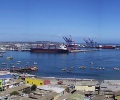Cooperation in the shipping industry to cut pollution from oceangoing vessels is running aground in Europe.
The European Union is moving to bring the maritime sector into its Emissions Trading System, a plan that would put a new tax on ships that serve the continent’s ports. The effort is part of the EU’s strategy to cut overall greenhouse gases by more than half over the next decade and obliges factories, power plants and airlines to pay for their emissions by buying carbon permits.
The idea has divided a shipping industry that has long operated in a special regulatory sphere that recognizes the international nature of the business. That could derail years of work to include shipping in the global anti-emissions efforts.
The EU plan still has a couple of years to go before it could take hold, but it is already drawing criticism from Japan, South Korea, Russia and Brazil. Officials in those big trading countries see any charges added to the cost of moving goods through European seaports as effective tariffs.
It also undermines work by the International Maritime Organization, an arm of the United Nations that is the global maritime regulator, to move forward antipollution rules that will be acceptable to all of its 174 member states.
“Europe can do what it wants, but it undercuts the collective efforts at the IMO,” said aid Lars Robert Pedersen, deputy secretary-general of Denmark-based industry trade body Bimco. “If you are pushing to have it your way, others will react and this will only push things back.”
The dispute casts a cloud over a shipping industry heading into the new year following a tumultuous 2020 that saw the Covid-19 pandemic disrupt world-wide supply chains and batter conventional shipping strategies.
Any new regional tax rules will ripple across a global economy seeking recovery in 2021. Ships are the backbone of world trade, moving commodities like oil, iron ore and grains and the vast majority of manufactured goods, including cars, home appliances, clothing and food.
Oceangoing vessels also collectively contribute around 2.5% of all greenhouse-gas emissions, according to the IMO, an amount comparable to the emissions of some of the largest EU countries.
IMO member-nations have broadly agreed on a plan to boost the fuel efficiency of some 60,000 oceangoing vessels by 40% over the next decade and cut overall greenhouse-gas emissions from ship exhaust by half in 2050 compared with 2008 levels.
The maritime addition to the EU’s Emissions Trading System, which was adopted by the European Parliament in September, will make shipping part of the continent’s effort to cut overall greenhouse-gas emissions by 55% by 2030, but doesn’t set any specific emissions-reduction targets for the shipping sector.
The EU Commission, the bloc’s executive arm, will start talks next year to bring in the industry in the ETS.
“The plan is vague, it doesn’t have set targets for shipping and the only thing that is clear is that it is saddling shipowners and freight forwarders with a tariff,” said a senior executive of a Japanese shipping operator. “These kinds of things can’t fly because tomorrow China and the U.S. may impose their own emissions tariffs, and the cost of moving goods will go through the roof.”
The EU tried to bring international airlines into the ETS in 2012, but the move was scaled back to cover only flights within Europe after fierce opposition from other countries. The U.S. Congress passed legislation barring American air carriers from paying the fee.
EU diplomats and shipping executives say there are already divisions in European capitals over how the measure can be applied. Big ship-owning members like Greece and Germany could see the daily operating costs of tankers jump by about a fifth, according to a study by Clarksons Platou Securities, an Oslo-based investment bank focused on the shipping, oil and energy services sectors.
Shipowners, who have widely backed the IMO’s plan, have invested heavily over the past couple of years in mandated cleaner fuels that cut sulfur emissions by more than 80%. They also expect to pump billions into new propulsion systems powered by biofuels, hydrogen or batteries to meet the IMO’s deadlines.
IMO officials declined to comment on the EU plan, but said any unilateral or regional schemes that conflict with the IMO will complicate a global consensus to reach the objectives.
“Shipping will do its part on the environment, but you can’t expect American, Indian and Brazilian companies to contribute to Europe’s economic recovery after Covid-19, by paying its carbon taxes,” said Bimco’s Mr. Pedersen.
Source: Hellenic Shipping






